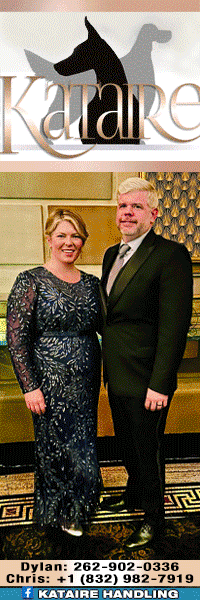An International Flavor
by Joan Harrigan
One of the most interesting aspects of Westminster isn’t even its dogs, but rather the people who attend it. Conversations begin at ringside, on line for lunch, or in the benching area. While spectators are united by a passion for purebred dogs, each individual has his or her own story. Because Westminster attracts competitors and spectators from all over the world, it’s an excellent chance to learn about other cultures, as well as other breeds.
Chan Weng Woh lives in Ipoh, Malaysia, but spends much of the year away from home, judging dogs. A retired high school English and mathematics teacher, he has bred Smooth Fox Terriers, Whippets, Pugs, Pomeranians, and Pekingese. As in the U.S., there are breeder judges in Malaysia, but Chan’s schedule is such that he no longer has his own kennel.
Chan is an all-breed judge, and has had assignments in 60 countries in North and South America, Europe, Africa, and Asia. He was twice the president of the130-year old Malaysian Kennel Association, which was originally established by English planters. Two years ago, the FCI asked him to go to Iran to determine whether their kennel club should receive FCI recognition. He made three trips to Iran, and in addition to meeting with breeders, judges, and kennel club officials, Chan visited research facilities and spoke with veterinarians and with the faculty of Iran’s veterinary schools. Chan was well-received in Iran, and the Iran Kennel Club did gain FCI recognition.
In Iran, you see mainly working dogs, as opposed to pets, Chan explains. He saw large native breeds like Caucasian or Central Asian Shepherds , as well as non-native Rottweilers working in fields. Iranians are not supposed to own toy dogs as companions, or to hug and kiss their dogs. “It is said that if a woman is seen hugging a toy dog on the street, she can be sent to prison,” Chan says. “However, I never saw that happen. People hide such dogs in their apartments or in their cars.” Though various Muslim sects view dogs differently, most Muslims consider them to be dirty. “If a Muslim touches a dog, he must wash his hands with soap and water seven times,” Chan says.
Malaysia is also largely Muslim, but the most common breeds there are Rottweilers, Labrador and Golden Retrievers, and Beagles, Chan says. His exhausting judging schedule means that he’s away from his family about nine months each year. “My wife is not much for dogs,” he says. “My two boys like dogs, but they don’t want to go to shows.” In July, Chan is slated to judge Group 9, the toy and companion dogs at the Oslo show, and in 2016, he’ll judge at the World Show. He has stopped by Westminster, a “very well-renowned show,” after assignments in South America, and is open and very willing to talk with spectators fortunate enough to sit beside him.
Short URL: http://caninechronicle.com/?p=71628
Comments are closed












